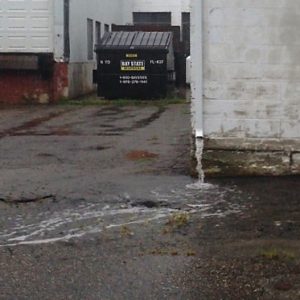This week the Exeter Select Board asked that residents voluntarily restrict their outside use of water to hand watering of vegetables and newly installed plantings, a recommendation recently made by many other cities and towns in southern New Hampshire. The region is suffering from a severe drought that will only be corrected by several inches of percolating rainfall.
 Today we are receiving a brief relief. A gentle rain of the kindest variety is falling, allowing dry earth and vegetation to soak it up. But even under the best circumstances rain creates stormwater. Before it has an opportunity to percolate and recharge the water table where it is filtered by soils and cleaned by plants and trees, stormwater washes over dirty streets carrying pollutants into local streams, rivers, and the Great Bay.
Today we are receiving a brief relief. A gentle rain of the kindest variety is falling, allowing dry earth and vegetation to soak it up. But even under the best circumstances rain creates stormwater. Before it has an opportunity to percolate and recharge the water table where it is filtered by soils and cleaned by plants and trees, stormwater washes over dirty streets carrying pollutants into local streams, rivers, and the Great Bay.
During the worst drought the region has seen in nearly two decades, it seems so wasteful not to capture this sweet rain to keep our landscapes and gardens lush and productive. Many homeowners do use rain barrels, but I wonder why roof water collection is not being utilized by more property owners? Some residents may not realize that many storm drains on Exeter streets tie into the town’s sewer, increasing the volume of water that must be treated. Perhaps when the cost of the soon-to-be built Exeter wastewater treatment plant is realized by taxpayers, percolating perimeter drains and grey water collection from roofs and other sources will be more widely considered by property owners. Dire economics can drive innovation, and this is not always a bad thing.
